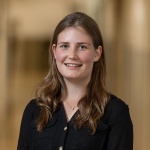You founded a start-up while you were still studying for your Bachelor's degree. What motivated you to take this step?
Jan Stein: I studied electrical engineering and information technology at the University of Stuttgart. I first met my co-founders, Maike Lambarth and Stephan Renninger, while working on my final thesis at the Institute of Photovoltaics. We had been investigating how CO2 can be split using power electronic plasma technology. Maike and Stephan asked me if I would be interested in working with them and Dominik Novakovic to put this technology into practice. I said I would need to sleep on it. The next day I said: I'll do it! We then applied for an Exist research transfer and founded our start-up Cyclize.
It was more the desire to realize something really cool than the desire to found a start-up. That was the necessity, so to speak. It was an intense period, but what helped me was prioritizing what needed to be done to keep moving forward - because everything felt important. I enjoy getting up to speed on new topics and am currently focused on human resources and safety-related matters. We now have a location in Stuttgart-Degerloch, 20 employees, and have recently expanded our premises. This shows me that my decision was exactly the right one.
What problem can your product solve?
JS: Our vision is to make carbon circular and thus reduce CO2 emissions. This means that we offer a chemical recycling process. We use plasma technology to recycle waste that cannot be processed using conventional methods, transforming it into a new input material for the chemical industry. This enables us to produce new, pure gas from very unpure materials that are difficult to recycle - a kind of substitute for natural gas.
What was especially helpful to you when you were establishing your company?
JS: Our professors Elias Klemm and Kai Peter Birke saw the potential in our work and encouraged us to put our idea into practice. We're fortunate to be able to operate our pilot plant on the university campus, where we're still testing and refining our process - an invaluable advantage.
If you're unsure where to start, the Technology Transfer Initiative (TTI GmbH) is an excellent first point of contact. They helped us to write a funding application for an Exist research transfer, which we then received. The services offered by the Institute for Entrepreneurship were also very helpful for us, especially Professor Alexander Brem, who gave us access to a strong network. We are currently mainly in contact with the university's TRACES transfer center, which advised us on how to set up a limited company.
What goals do you want to achieve with Cyclize in the coming months?
JS: The chemical industry is aiming to decarbonize by transitioning away from fossil fuels and embracing electrification. The challenge, however, is that no one wants to build the first full-scale plant, as the risks are high and technical failures could significantly impact downstream processes. We want to be the first to show that our technology is stable and can be operated safely on a larger industrial scale. To this end, we want to build a plant in a chemical park. Our gas mixture of carbon monoxide and hydrogen is extremely toxic and therefore too dangerous for transportation. We need to be able to feed it directly into the next plant where it is needed.
You were recently listed in the “30 Under 30” by the US business magazine Forbes. What does this award mean to you?
JS: Being part of the “30 Under 30” shows me that I was right to dare to found a start-up so young and to sacrifice a lot for it. It also proves that Cyclize is a leading deep-tech start-up in Europe. It's quite an honor to be on a list like this.
What motivates you to keep going when things aren't going so well?
JS: That really is an idealistic drive. If a significant number of our plants are built in Europe, we have the potential to substantially reduce CO₂ emissions and recycle large volumes of waste. This is already a reality today on a small scale. Bringing this technology into large-scale industrial application is an incredible drive.
We also have a really great team at Cyclize with a high level of expertise and great motivation. Everyone pitches in and has good ideas. That’s also a crucial factor - especially when your energy dips, the others will lift you up and keep you going.
Knowledge and technology transfer at the University of Stuttgart
The TRACES Transfer Center is the University of Stuttgart's central point of contact for research and knowledge transfer. In cooperation with the Institute for Entrepreneurship and Innovation Research (ENI), the Technology Transfer Initiative TTI GmbH and Department 1 - Research and Transfer, TRACES forms an innovative transfer and start-up ecosystem for founders. It provides support and advice from the idea to the spin-off. With a wide range of courses, start-up coaching and advice on proposals, funding programs or patents and property rights [de], the University of Stuttgart supports start-up projects by students and employees. The ENI's “Entrepreneurship” newsletter provides information about current news, events and competitions in the start-up ecosystem twice a month.

Jacqueline Gehrke
Online Editor





